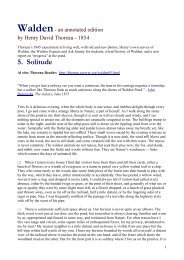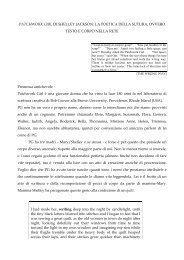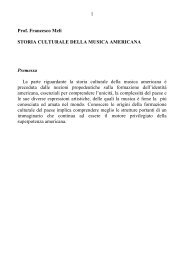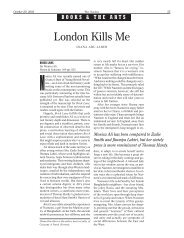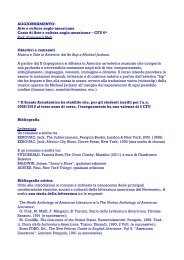Rewriting Woolf s Mrs. Dalloway: Homage, Sexual ... - Paola Carbone
Rewriting Woolf s Mrs. Dalloway: Homage, Sexual ... - Paola Carbone
Rewriting Woolf s Mrs. Dalloway: Homage, Sexual ... - Paola Carbone
You also want an ePaper? Increase the reach of your titles
YUMPU automatically turns print PDFs into web optimized ePapers that Google loves.
Richard <strong>Dalloway</strong> to be liked"), and, interestingly, his potential androgyny. InThe Voyage Out, Clarissa says of her husband: "He's man and woman," whichwas said of various men and women in Bloomsbury; Vita Sackville-West referredto such individuals as "dual personalities," a term that today may be likened to"bisexual" (Lippincott ii, i; Garber 26).These ten extracts give an early clue to where Lippincott is headed. We soonlearn that Richard has a "secret" (7). Strolling about London and observing peopleon the street, he thinks: "If she only knew. If he only knew. If they only knew"(10). Richard is in love with Robert Davies—a fact known only to Clarissa. Thetwo men have carried on an affair for ten years, and on this particular summerday they impulsively test and transgress some of the ground rules governing theirrelationship: Richard shows up unexpectedly at Robbie's house; Robbie showsup unexpectedly and enters Richard's house for the first time; though not invited,Robbie attends Richard and Clarissa's anniversary party. Much of the novel'stension stems from uncertainty as to what each of the men will do on this day andfrom the conflict between Richard's public life with Clarissa and his secret lifewith Robbie.Like Cunningham, Lippincott appropriates many of <strong>Woolf</strong>'s tropes andthemes, such as the notion that we possess multiple selves: "[Richard] feltrefreshed, restored, returned to himself—to Mr. <strong>Dalloway</strong>, to Richard, Dick,Richie, Rich—returned to whomever he was for whichever person at whatevertime or place: he could be all or any of them simultaneously (for he was all ofthem)" (71, emphasis in the original). The mutability of the self is often highlightedin queer texts; yet what makes Mr. <strong>Dalloway</strong> most intriguing is the wayin which Lippincott, by focusing on Richard, brings male sexuality into the narrative.Although much recent attention has been devoted to sexual orientationand gender in <strong>Woolf</strong> studies, the focus has been on lesbianism. Virginia <strong>Woolf</strong>:Lesbian Readings (1997), for instance, consists of the work of more than adozen critics who seek, among other things, to counter Quentin Bell's image of<strong>Woolf</strong> as a "sexless sappho" and demonstrate how central lesbianism was toboth her life and her work (Barrett 6). Whereas <strong>Woolf</strong>'s and Cunningham'stexts are female-centered, Lippincott is more interested in male characters(Richard, Robbie, Richard's brother Duncan <strong>Dalloway</strong>) and their interactionwith one another, tn Lippincott's London, Oscar Wilde is still in the air.Although his trial and imprisonment for homosexual offenses took place threedecades earlier, his example continues to remind gay men of the perils of publicdisclosure: "[W]hat Wilde had done and, subsequently, what had been doneto him, had been hammered, repeatedly, again and again, into the minds of theyoung men of Robert Davies's generation" (67). In constructing a past forRichard, Lippincott posits a significant homoerotic relationship betweenRichard and his brother Duncan: "[O]ne of his earliest memories was of Duncanand him in bed together, after everyone had gone to their rooms and thehouse was dark. [. . .] it was his first, felt experience of the warmth cast off by374 CRITIQUE



